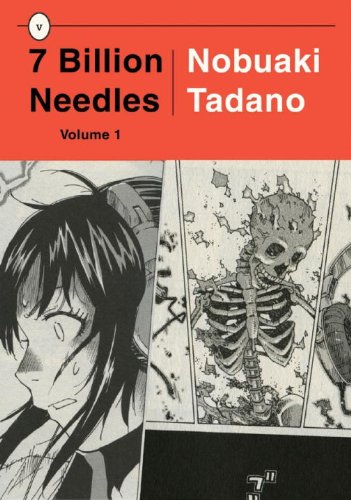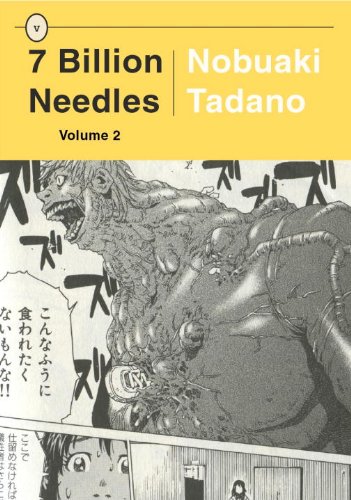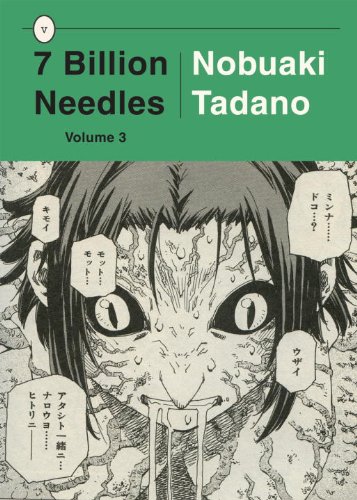
Best Adaptation of Another Work, 2011: Nobuaki Tadano’s 7 Billion Needles
January 31st, 2012 by david brothers | Tags: nobuaki tadano, verticalThe first thing adaptations of any sort need to do is justify their existence. What does Stanley Kubrick’s 2001 do that Arthur C Clarke’s novel doesn’t? That justification is crucial, because otherwise, why not just read the book? Adaptations that are just direct, or near-direct, copies, like Robert Rodriguez’s Sin City or Zach Snyder’s Watchmen may provide a briefly visceral thrill at seeing what was previously limited to your imagination turned into real life and then displayed on a giant screen, but they don’t have anything over the original works beyond being films. Adaptations need to reveal some previously hidden truth or adjust the story for a new context in order to be truly worthwhile. A 1:1 adaptation simply isn’t enough. Nobuaki Tadano’s 7 Billion Needles, the latter half of which was published this year, is an adaptation that justifies its own existence.

It’s based on Needle, a science-fiction novel from 1950 by Hal Clement. In Needle, an alien life form comes to Earth and takes up residence inside a human boy. The alien is on Earth in hot pursuit of another alien, a hostile one this time, and enlists the boy to help in that battle. The hostile alien has hidden inside another human, and they must solve the puzzle before it’s too late.

7 Billion Needles keeps the broad strokes of the story. There is a kind alien and a hostile one. The boy has been replaced by Hikaru Takabe, a teenaged girl, and the conflict plays out in a vastly different manner. Rather than dealing with paranoia, it’s more about growth, both emotional and physical. Hikaru is exceedingly reserved after a personal tragedy, and has trouble making friends. She’s quiet with her family, too, even though they have taken her in. Thanks to the influence of the alien, she learns how to open up and just how important relationships actually are. You could even say that she learns just how important the relationships she already has are to her, though she may be actively avoiding or simply not cognizant of that fact. It takes time. There’s no magic button that opens up her emotions, but she eventually grows into a fuller human being.

Evolution plays a major role in the series, too. The question of what direction life on Earth should take, how dominant species can upset an ecosystem, and how species contamination works, are important parts of the latter half of the series. While it may not be scientifically sound, it does make for a very interesting wrap-up to a series that’s simultaneously personal and apocalyptic.
7 Billion Needles is a great example of pulling inspiration from an existing work and then doing it justice. Direct adaptations might as well be photocopies. Finding something new to say with an old story is much more interesting.

I’ll be on the lookout for this (android/digital). Also, I’d like to re-watch The Hidden, which appears to have ripped off the original novel, but was pretty enjoyable when I saw it 20+ years ago. Not streaming on Netflix at the moment, though.
Yeah, this is a great variation on the original. I like that it includes the original comic that was the inspiration for the character, because apparently if you combine that with Needle you get giant monsters and a battle for the evolution of all life.
You know that I come to think about it Needle is pretty close to the Hal Jordan Green Lantern origin…
The summary reminds me of Parasyte, which used to be a semi-popular manga in the US, and is now kinda forgotten.
Man, I thought I was the only person aware of this comic’s existence. Hopefully more people will pick it up now because of this.
“What does Stanley Kubrick’s 2001 do that Arthur C Clarke’s novel doesn’t? That justification is crucial, because otherwise, why not just read the book?”
This is going to sound horribly picky, but I can’t not say anything now I’ve noticed this.
If it wasn’t for 2001 the film, we wouldn’t *have* 2001 the book. Kubrick took the inspiration for the film from an earlier Clarke story, and then 2001 the film and the book were created in parallel.
So, maybe not the best example for the point you were trying to make. (Sorry.)